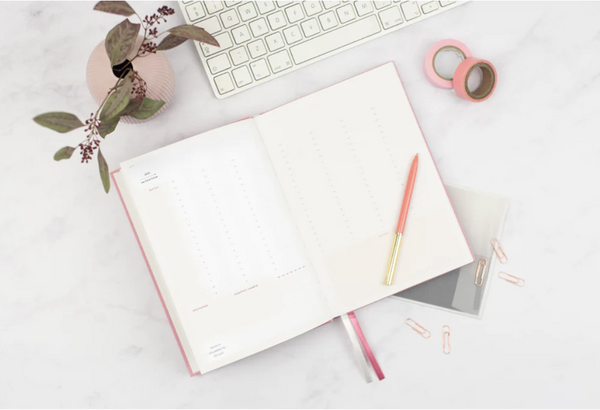The life of an entrepreneur is exciting, exhausting, flexible, and potentially freeing. When you’re setting your own schedules and creating your own work, you have to be a lot more diligent about what’s a priority. If you work from home, it can be easy to start blending the time you could be working with doing things around the house. Distractions abound when you don’t have to go anywhere. When you’re completely in charge of your day-to-day, as most of us are working from home these days, there are some strategies that you can implement to ensure that you plan your day in the most productive manner, and finish what you want to finish as well. Let’s take a look at what it takes to plan your day and actually stick with it when you’re working from home.
How To Plan Your Day Productively

When it comes to planning your day productively, it’s important to pause and take a look at what already is and isn’t working for you. Are you a morning person? Have you ever been a morning person? If you’ve never been a morning person, becoming one is going to be a very difficult task. It’s important to set yourself up for success as much as possible. However, just because some of us aren’t morning people doesn’t mean we are rushing around in the mornings when we wake up later than the early risers. It just means we have tailored our schedules to work with our sleep cycles.
When are you most alert and productive during the day? If you feel most productive at 6 in the morning, set aside time to get work done at 6 a.m. If you want to have your morning tea and a shower before you begin work - that might mean going to bed earlier and waking up earlier. If you are most productive in the evenings, block out a chunk of time in the evenings to focus on your work and nothing else, no distractions, cleaning the house, or social media. When you set aside time every single day that you have scheduled or intentions to do work, be sure to commit to it.
What tasks will get you closer to your actual goals? If you don’t have actionable goals, step #1 is to know your goals. Write out a list of small tasks, from daily to weekly to monthly, that will move you closer to achieving your goals. Is checking your email going to help you reach your goal? Is scrolling social media? Is loading the dishwasher helping you hit the mark? If not, then push those down the list. If you’re one of those people that want a clean kitchen before you can start working, clean it the night before if you’re a morning worker (and clean it in the morning or afternoon if you work better in the evenings).
Write it down. Writing things down is useful in so many aspects of adulting. Writing down expenses. Writing down a budget. Writing down a to-do list. Writing down your goals. The more details you can get out of your brain and onto paper (or digitally), the easier it is to organize all of those puzzle pieces into a successful, cohesive plan. Having a dedicated location where you can write everything down for all of these ideas, budgets, and plans will make it much easier to be consistent. You can use a planner, like the Ponderlily planners found here, to keep track of everything that’s important to you.
How To Implement Your Plan Consistently And With Effectiveness

Coming up with goals and ideas is all fine and dandy, but actually implementing these plans and sticking with them is often the greatest challenge. Just like New Year Resolutions have a tendency to start dropping off after a time, the same can hold true for sticking with other kinds of plans.
Let’s take a look at some strategies that will help you actually stick with your plans for the day, the week, the next 5 years.
Be flexible. This might feel counterintuitive, but building in flexibility is important for success because things will always eventually come up that throw us off course. Plans change. Goals change. You have to move across the country. Your car broke down leading to unexpected expenses. This is life. If we say, “I must do this thing every single day or I’ve failed,” then most likely you will “fail” if you are setting your standards at perfection. Be flexible.
Write it down. This one needs to be reiterated. Write things down. Keep your planner in a place where you will see it every morning and every night. Maybe even keep it open in a designated space with a pen sitting right on top. Make things easier for yourself. It’s hard to stick with things. It’s hard to create new habits. The easier we make it for ourselves to succeed, the easier it gets.
Do what you’re most passionate about. It’s hard to be motivated to do the things you don’t care about. Find something that lights you up, something you’re willing to put the work in for. When you find the things you care about, it’s much easier to stick with your plans. If you need to do things that don’t completely light you up, it’s all about perspective. Shift your perspective to: “I want to do this,” versus I have to, should, or need to do this.
Figure out the root cause of plans that aren’t sticking. We talked about being a morning or night person earlier. Some of this is just personal preference, but could you become a morning person if you wanted to? Ask yourself some questions to find the root cause. Can’t wake up early because you’re tired? Is the root cause staying up too late? Are you staying up too late because you need to get your work done? Are you working late doing work because you didn’t prioritize the essentials earlier in the day or manage your time well? Look at all of the things contributing to habits that seem to be failing.
These “failures” aren’t true failures, they’re an opportunity to regroup, come up with a new game plan, and try again with more information.
Planning your day and actually sticking with those plans is entirely possible. It doesn’t mean you’ll nail it perfectly on the first try, but with some dedication, self-awareness, and strategy, you’ll be reaching your daily goals in no time! Here's a great free resource that can help.

Drop your big tasks and “musts” for the week into your planner first, and then start filling in around them to ensure that you’re utilizing your time as wisely and efficiently as possible.






